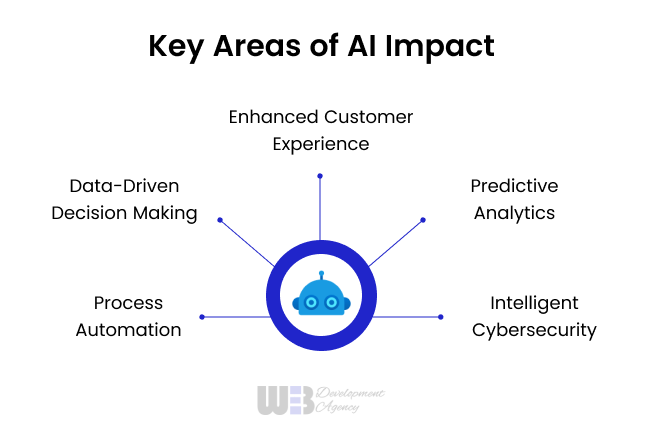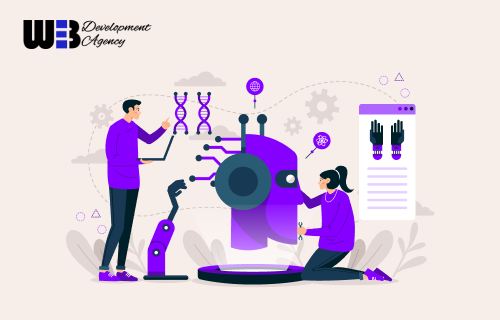In the relentlessly evolving business landscape, digital transformation has become essential for enterprises seeking a competitive edge. Artificial intelligence (AI) is emerging as the powerhouse of this transformation, enabling companies to optimize processes, improve decision-making, and redefine the customer experience. Let’s explore how AI is revolutionizing digital transformation initiatives.
Key Areas of AI Impact

- Process Automation: AI-powered tools can automate repetitive and time-consuming tasks across various functions. This automation frees up employees to focus on more strategic work, boosting organizational productivity and efficiency.
- Data-Driven Decision Making: In a data-rich world, AI excels at extracting insights from vast datasets. Algorithms can identify patterns, trends, and anomalies that would be difficult for humans to detect, offering data-driven recommendations to support informed business decisions.
- Enhanced Customer Experience: From smart chatbots to personalized product recommendations, AI enables businesses to deliver hyper-personalized experiences across the customer journey. This leads to increased customer satisfaction and loyalty.
- Predictive Analytics: AI can predict future outcomes, such as demand forecasting, equipment maintenance needs, and customer behavior. This predictive power allows enterprises to proactively address potential issues and capitalize on upcoming opportunities.
- Intelligent Cybersecurity: AI can detect and mitigate cyber threats in real-time using advanced pattern recognition and anomaly detection. This safeguards critical information and infrastructure, minimizing losses due to security breaches.
Real-World Examples
- Manufacturing: AI optimizes manufacturing processes by predicting equipment breakdowns, streamlining supply chain management, and improving quality control through computer vision.
- Finance: AI assists in fraud detection, risk assessment, and algorithmic trading, enhancing decision-making in financial markets.
- Healthcare: AI is transforming healthcare with image analysis for disease diagnosis, personalized treatment plans, and drug discovery acceleration.
- Retail: AI powers product recommendations, inventory optimization, and dynamic pricing strategies, ensuring businesses provide the right products to the right customers at the right time.
Getting Started with AI for Digital Transformation
- Strategic Alignment: Identify clear use cases where AI can deliver tangible value, ensuring alignment with overall digital transformation goals.
- Data Infrastructure: Robust data collection, storage, and processing systems are critical for effective AI deployment.
- Talent and Skills: Build an AI team or partner with experts, emphasizing the blend of technical and business acumen.
- Ethical Considerations: Implement responsible AI practices to address potential biases, transparency, and accountability.
The Future of AI in Digital Transformation
AI is still in its relatively early stages of widespread adoption, but its influence on digital transformation is undeniable. As AI technology continues to evolve, we can expect even broader applications, driving businesses across numerous industries toward greater innovation, agility, and customer-centricity.
Enterprises that embrace AI and leverage its capabilities for digital transformation have the potential to disrupt their sectors and gain a significant competitive advantage. The AI-powered future is here – are you ready?

